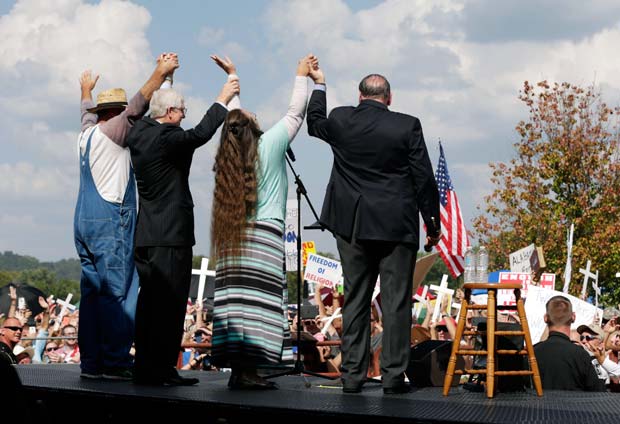In yet another effort to countermand marriage equality, Republicans launch First Amendment Defense Act

Rowan County Clerk Kim Davis, second from right, stands with Republican presidential candidate Mike Huckabee, right, attorney Mat Staver, second from left, and her husband, Joe Davis, at the Carter County Detention Center, Tuesday, Sept. 8, in Grayson, Ky., after Davis was released after being jailed for refusing to issue marriage licenses to gay couples. (Pablo Alcala/Lexington Herald-Leader via AP)
James Russell | Staff Writer
Russell@dallasvoice.com
When the Supreme Court issued its historic Obergefell decision in favor of marriage equality on June 26, some county clerks across the nation wasted no time in issuing marriage licenses same-sex couples, including clerks in Dallas, Tarrant and Travis counties.
Others were more hesitant, offering various reasons for delaying. Some wanted to wait for the proper forms from the state Bureau of Vital Statistics; others, like Hood County Clerk Katie Lang, a first-term Republican, flatly refused to issue licenses altogether because doing so, they claimed, would be contrary to their personal religious beliefs.
A statement released by Texas Attorney General Ken Paxton allowing clerks to refuse to issue licenses based on religious objections didn’t help.
But faced with lawsuits by both same-sex and opposite-sex couples, however, many clerks decided quickly to comply with the law. After a legal tug of war and a series of mixed messages, Lang settled last month with gay couple Jim Cato and Joe Stapleton, who have been together for 27 years.
Then there was Rowan County, Ky. Clerk Kim Davis. Defying court orders, Davis turned away both same- and opposite-sex couples seeking to receive marriage licenses.
Her reason?
“To issue a marriage license which conflicts with God’s definition of marriage, with my name affixed to the certificate, would violate my conscience,” Davis said in a statement. “It is not a light issue for me. It is a heaven or hell decision. For me it is a decision of obedience. I have no animosity toward anyone and harbor no ill will. To me this has never been a gay or lesbian issue. It is about marriage and God’s word.”
Davis, a recently born-again Christian married numerous times before her conversion, refused to even allow any of the deputy clerks in her office issue marriage licenses despite numerous court rulings against her. She was eventually held in contempt of court and sent to jail, but was released earlier this week after having been jailed since the previous Thursday.
Davis has become a cause célèbre and her name a rallying cry for right-wing Christian conservatives, who claim Davis is being targeted for being Christian and denied her constitutionally-guaranteed freedom of religion.
But even before Kim Davis took her stand, politicians courting the right wing started introducing legislation claiming to protect religious freedoms. Under one bill — proposed in June before the Obergefell decision was delivered — Davis and others like her would be able to freely flout the law by claiming their religious beliefs made them exempt.
On June 17, U.S. Sens. Mike Lee, R-Utah, and Raul Labrador, R-Idaho., who are both up for re-election, introduced the First Amendment Defense Act. It would prevent the government from taking “adverse action” against an individual or entity based on a religious belief that marriage is between two individuals of the opposite sex.
So, a county clerk or small business owner or anyone else could deny services to same-sex couples without worrying about what the law actually requires, just by claiming they object to same-sex marriage on religious grounds.
This is the bill’s second appearance; it was first introduced in 2014 as the Marriage and Religious Freedom Act.
“Religious freedom is at the heart of what it means to be an American,” Labrador said in a statement explaining the legislation. “America set the standard for upholding freedom of belief and worship in a diverse society.
Our bill ensures that the federal government does not penalize Americans for following their religious beliefs or moral convictions on traditional marriage.”
Lee added, “The vast majority of Americans today still hold a robust view of religious liberty, yet across the country the right of conscience is threatened by state and local governments that coerce, intimidate, and penalize individuals, associations, and businesses who believe that marriage is a union between a man and a woman.”
The two lawmakers claim the bill is necessary to protect the religious liberties of small business owners who have religious objections to same-sex marriage.
As of press time, the bill had 148 co-sponsors in the House and 36 in the Senate. It has the support of both Texas Sens. John Cornyn and Ted Cruz and 23 of the 26 Republican members of the Texas delegation. Only one Democrat, Rep. Dan Lipinski of Illinois, has signed on.
Rep. Kay Granger of Fort Worth is the only Dallas-Fort Worth area Republican to not co-sponsor the bill.
Differing definitions of religious liberty
While Labrador and Lee believe it simply protects religious conscience, Elise Helgesen Aguilar, federal legislative counsel for Americans United for Separation of Church and State, disagrees.
“This bill is a misnomer, as it does not defend, but rather distorts the principle of religious freedom, allowing the religious beliefs of one individual or organization to trump the rights of others,” she wrote via email.
“This bill would give government workers an absolute and unqualified right to refuse perform their professional duties due to their religious beliefs regardless of how it would affect other people.”
Under the 1994 Religious Freedom Restoration Act, an individual seeking exemption from the law must prove a law “substantially burdens” that person’s religious beliefs. That law passed with bipartisan support and was signed by President Bill Clinton.
That wasn’t the case this past summer when state legislatures in Arkansas and Indiana passed their own versions of religious freedom restoration laws, ahead of Obergefell. Opponents called the bills “licenses to discriminate.”
Outrage from LGBT advocates and businesses prompted an amendment to Indiana’s law, but attempts to amend Arkansas’s bill failed. Efforts to enshrine Texas’ own RFRA in the state Constitution during the most recent legislative session were derailed after opposition from LGBT advocacy and business groups.
This new measure, Aguilar wrote, goes a step further and “provides a blanket exemption to anyone who alleges that they cannot perform their government duties because of their religious beliefs — no questions asked.
Under this bill, the government must allow workers to refuse to perform their duties, regardless of the harm it causes to others.
“If passed,” she added, “it would allow federal government employees acting in their official capacities to discriminate against others.”
If anything, Davis certainly wouldn’t be alone anymore.
“Indeed, its goal is to create more Kim Davises,” Aguilar agreed.
But Davis and her clan wouldn’t have cover under the law for long. If challenged in court, there is no doubt it would be found unconstitutional, Aguilar insisted.
“The Establishment Clause [of the U.S. Constitution] precludes the government from granting religious exemptions that come at the expense of innocent third parties,” she explained. “Although the government can provide religious accommodations that are not mandated by the Free Exercise Clause, the Establishment Clause prohibits the government from providing accommodations that harm other people.”
Jody Scheske, an Austin lawyer who recently represented parties in two same-sex divorce cases before the Texas Supreme Court and who specializes in religious liberty issues, is familiar with the bill and others like it.
He dismissed it as a fundraising scheme for both conservative Republicans and religious liberty groups like Liberty Counsel, the right-wing organization that is defending Davis.
Having lost the fight for marriage equality, religious liberty groups are now finding other ways to attack LGBT rights, Scheske said, adding that contrary to what opponents of LGBT rights say, religious liberty is not under attack.
“It’s ludicrous. [Religious freedom is] already clearly defined in the Constitution and protected under the First Amendment,” he said.
It is unlikely the bill would pass even in the Republican-controlled Congress, much less gain the votes to override a veto by President Barack Obama. Still the fight over religious liberties and the Kim Davises of the world continues in a clear sign that the fight to protect minority rights — including LGBT rights — is never truly won.
This article appeared in the Dallas Voice print edition September 11, 2015.



